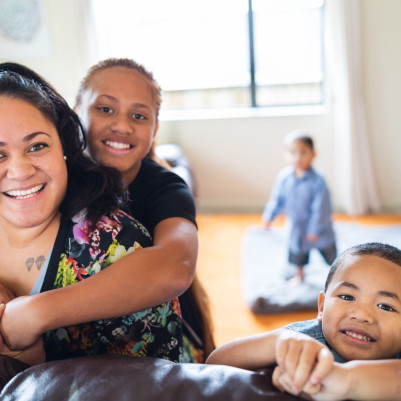Budgeting

A budget helps us feel in control, instead of just wondering where our money went. It can mean the difference between being able to plan ahead versus always having to go into overdraft between paydays.
Budgets are for anyone who is managing money coming in... and going out. Most of us who have to make choices about our money can benefit from a mahere pūtea. It's not just for anyone having difficulties making ends meet.
A budget (or money plan) is really just a simple plan for your spending.
Essentially, your money plan:
To create a budget, start by adding up how much money is coming into the household (your moni whiwhi), and how much is going out (your spending), then work out the difference.
Making a plan for your spending is easy with our budget planner – give it a try!
You will either have money left over (a surplus) or not enough money to cover your spending (a deficit). The aim is to make as much of a surplus as possible so you have money left in your pocket to save for your goals or pay off debt faster.
You can use a budget to work out how much you can save each payday and flow this towards what you want. We call this ‘paying ourselves first’.
You can use a budget to see where that extra money is going, and how much you are spending on your debt. You can also see if there are ways to spend less or earn more.
A good budget can make it much easier to manage your money and reach your financial goals.
Your online banking will show most of your spending, but receipts from shopping and bills from the past three months can also come in handy.
These will show your regular expenses like rent or mortgage, car loans, pay-later options, personal loans, credit cards, rates, phone, power, rīanga and subscriptions like Netflix or Spotify (as well as the other things that are easy to forget about – like Uber Eats).
These are things you pay for less regularly like vehicle registration and warrant of fitness, medical expenses, koha or holidays.
This will be any after-tax money you have coming in, such as your pay, benefits or allowances, NZ Super or interest earned on savings.
This includes details of any regular savings you already have.
Making a spending plan can help you increase your regular savings to help you get ahead over time.
After setting a budget, it’s helpful to track your spending to see how it’s working. This way, you can see what's working and refine it over time.
You could try a spending diary or use an online tool or smartphone app. Setting up different bank accounts to manage your budget can work really well too.
Budgeting isn’t just about watching our spending. How much we earn also affects whether we have money left over for saving towards our goals or paying off debt. So part of our plan needs to include goals for growing income, too.
People’s needs typically increase over the years. And if our income doesn't grow, we effectively earn less each year just because of tāmi ahumoni (when prices go up and our dollars buy less).
The Careers New Zealand website has broad salary information for different types of jobs.
Online job sites and salary survey reports also show what someone in your position with the same experience and skills should be earning. You can also contact recruitment agencies to find out what similar roles are currently paying.
Your goals, definitely. A budget is simply a plan to flow your money towards what you want, to live your best life. Budgeting helps for many reasons: to make sure we don't spend more than we earn, that we have enough for bills, to make ends meet. But the key thing with budgeting is to make a surplus – to have extra money left over and not a deficit. Once you do, you've got money to aim at whatever goals you'd like to set. Here's where to start your budget.
Using a budget to plan your spending and sticking to it not only helps make ends meet, it enables you to reach goals for the short, medium and long term. Most things we'd like to achieve in life take money, and that money needs saving if we want to avoid too much debt. Once you've got a surplus in your budget, you can make sure it gets saved automatically into separate accounts, where it can build towards what you want. To get you started on thinking about some goals today, here's our goal planner.
It helps to have a plan! To build a great budget that you can stick to, it helps to first know your numbers. By tracking your spending, you’ll start to see where your money is going, and you’ll be better placed to make decisions about where you really want your money to go. The key is to capture everything you spend for a month or two to get your full spending picture. There are several apps designed to track spending on the go. You can also download your past three months of transactions from your bank, which really helps to see the patterns. Here’s more on money tracking.
So we don’t follow random money tips from just anyone, it helps to get professional, independent personalised financial advice. (It doesn't have to cost an arm and a leg.) Here's our guide to getting advice. Whichever kind you need, it helps to shop around, meet with a few advisers and find a good fit. For advice about debt and budgeting, you can discuss your situation – even anonymously – with the team at MoneyTalks, which runs a free helpline. Easily chat online, call 0800 345 123 or text 4029 today.
The classic "envelope" or "jar" technique helps give every single dollar a job to do. (Sorted's budgeting tool is a digital version of this.) With this way of budgeting, you add up your incoming money and then divide it into the different categories you need to spend on, like your regular expenses (rent, mortgage, phone, power, insurance) and your irregular ones (like food or petrol, which can go up and down). Here's our budgeting tool so you can start your plan today.
Incomes can be lumpy when you're a freelancer, depending on the gig or the project. To start, it helps to figure out the minimum amount of money you'll need to meet your expenses. When you've worked out what you need to get by, you then know that what you earn above that amount each month needs a plan. You can set aside a percentage that will allow you to make sure you're working towards your goals, even when your income goes up and down. Here's more for contractors.
Congratulations! Making a spending plan for when baby arrives is about budgeting for reduced income, and for the additional expenses that come along, like baby gear. Many couples find it helpful to do a test run on a single income before baby arrives. This gives you an early perspective on your expenses and any adjustments you need to make. Here's more for when you're planning for your new arrival.
It's pretty competitive in the world of companies who provide us things like power, internet or phone service. But when one of them suddenly lowers their prices, we might not hear about it. So it helps to review our providers at least once a year. Because new players and new offers come along regularly in these industries, we could save hundreds by reviewing and switching to better deals out there. How much difference would it make in your budget?
Budgets are for spontaneous people too! The trick is to have money for those spur-of-the moment expenses as part of your spending plan. Knowing what your limit is takes the guesswork out of it, but it also gives you the flexibility you need. What's most important is that you make a plan that’s right for you. Here's our budgeting tool to start your plan today.
Rent will probably be your biggest ongoing cost when you’re flatting. You can look online to get an idea of typical rents in your desired location. Then, using our budgeting tool, you can work out how rent will fit into your overall spending plan. You’ll also typically need to plan to pay a bond of up to four weeks’ rent, plus two weeks’ rent in advance, so you’ll need to budget to save up. Ideally it would be good to keep your rent to 30% or less of your entire budget, and all your living expenses to 50% or less, but that’s not always possible.
More couples these days seem to be managing their money separately, which is good for each person’s autonomy and independence, but not necessarily for communicating. It’s so important to communicate well about money in a relationship. And while it’s only natural to have differences of opinion, getting on the same page brings many opportunities to get ahead financially that we wouldn’t have on our own. Here’s more for when you’re planning with your partner.
Probably. Having a separate account to funnel your savings into helps it grow and not get mixed in with all your other spending. And the more automatic and out of sight, the better. We’re guessing you’re not just saving for the fun of it, but for goals you want to achieve. Having separate accounts for each of your targets is also useful, not only because you can more easily track your progress, but also in case you need to look at some other investment options for one or other of your goals (like term deposits for the short term, a managed fund for the medium term). Here are more goal-setting ideas.
Beyond looking for a side hustle to earn more, it may be time to make some cuts. Trying to sustain the same lifestyle after taking a hit to your income can be extremely challenging, and it’s good to be realistic about whether this is even doable. Unless you have an accurate picture of your incomings and outgoings, you could end up in a difficult debt spiral. Here’s where to see your current situation clearly and make a new plan.
Planning your spending in the near term is one thing (here’s our budgeting tool for that), but making long-term plans for goals that are decades away, like retirement, is quite another. Even if it feels so far away, it’s never too early to put some plans in place. Here’s where to start when you’re looking ahead and thinking about your future lifestyle.
Congratulations! There are so many beautiful and memorable ways these days to celebrate your wedding in your style, on your budget. Because you can now have multiple budgets in Sorted’s tool, you can easily create a separate wedding plan (or even more than one, to work out different options for your special day). Start by listing every item, from invitations to flowers to the dress. Here’s where to begin.
There are many rules-of-thumb budgets out there, like the "50-30-20" rule for needs, wants and savings. But people’s situations are far more varied, so this one doesn’t necessarily work for everyone. Your needs might not be covered by 50% of your income, or 20% on savings may not be enough – depending on what you’re aiming to achieve. What's most important is that you make your plan to suit your circumstances. Here's our budgeting tool to start your plan today.

Need help with creating a budget or making ends meet? Reach out to MoneyTalks on 0800 345 123 – even anonymously if you like – for personalised help.
Don’t know where to start? Our 6 steps will help you to take control of your money.
Head to the 6 steps

Use verification code from your authenticator app. How to use authenticator apps.
Don't have an account? Sign up
Or log in with our social media platforms


A Sorted account gives you a personal dashboard where you can save your tools, track your progress and you'll also receive helpful money tips and guidance straight to your inbox.
Or sign up with our social media platforms

